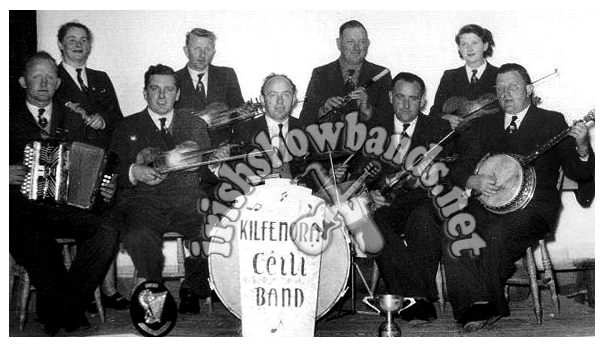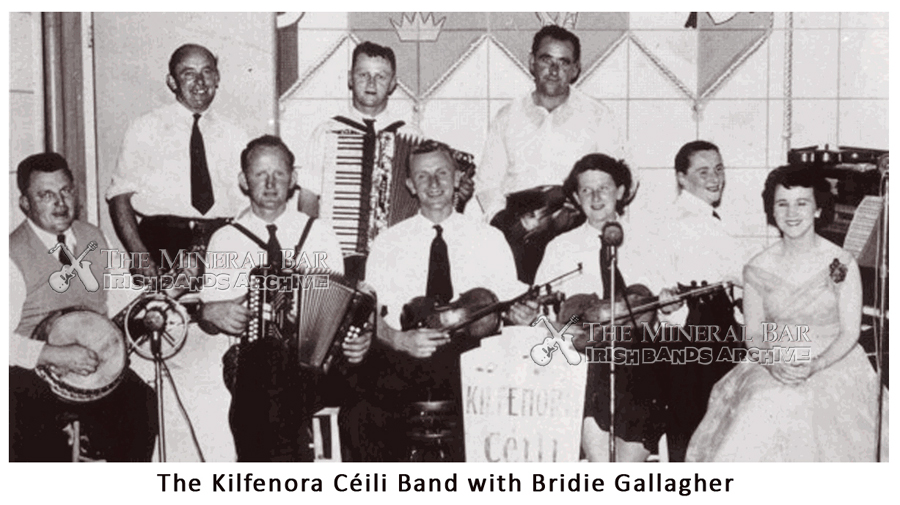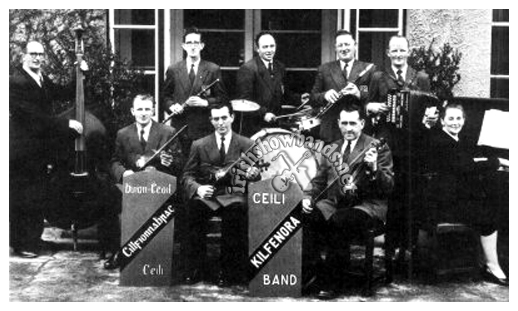|
2009 was the centenary
celebration of the formation of the Kilfenora band, one of the top
ten longest-established musical ensembles in the world. Not only was
this an historic milestone for the band itself but a reminder that
Irish culture and traditions are thriving and have survived the test
of time. A full history of the band and of music in North Clare is
on view at the Kilfenora Céilí Band Parlour, located in the Burren
Centre, Kilfenora. (This is the only museum in the world that we
know of dedicated to living musical artistes, with a wealth of
exhibits and audio-visual elements, which was formally opened by the
President of Ireland in March 2015.)
The 11-piece band features
four fiddles (Eimear Howley, Sinéad Heagney, Anne Rynne and
Annemarie McCormack), two flutes (Anthony Quigney and Garry
Shannon), concertina (Tim Collins), accordion (Claire Griffin),
banjo (John Lynch), drums (Sean Griffin) and piano (Fintan McMahon).
Other musicians from Kilfenora and around augment the band at times
for example when performing special concerts, when Sharon Howley on
cello and Brian O’Grady (see picture below) join the band, together
with fine singers such as Edel Vaughan and Don Stiffe – also
featured on the band’s recent CDs.
Most of the current line-up
has been together since 1993 under the leadership of John Lynch.
With the previous generation advancing in age, the band was going
through something of a hiatus in the early 90s. Then John succeeded
Kitty Linnane as bandleader and re-entered the band into the
All-Ireland competitions – and they repeated the feat of the ’50s
band by winning three years in a row (1994-6). Soon they were being
invited to Britain, France, America and cruise tours of the
Mediterranean, and resumed their position as Ireland’s premier céilí
band – and the only one always to perform gigs at full competition
strength. Their forte is instrumental music with some harmony and a
driving rhythm.
They often play at céilís,
but in recent years have increasingly been providing concerts,
featuring additional instrumentalists, singers and dancers. Some
shows have included audio-visual material too. The band has
repeatedly sold out the Irish National Concert Hall in Dublin and
are regulars at major festivals around the world, such as
Glastonbury and Irishfest in Milwaukee. In 2014, the band led a
successful creation of the largest céilí band ever – some 280 people
gathered together at the Kilfenora Trad Music Festival – as
recognised by the Guinness Book of Records (the certificate is on
view in the Kilfenora Céilí Band Parlour).
Younger blood is gradually
being introduced into the line-up in order to perpetuate the band’s
success. Whatever the future holds, the objective of the present
band is to continue in the style of their predecessors. By staying
true to traditional instrumentation and repertoire and applying some
judicious innovation, they are determined to cement their tradition
and secure the future and while so doing reach yet another
generation of audiences.
courtesy of
kilfenoraclare.com |


